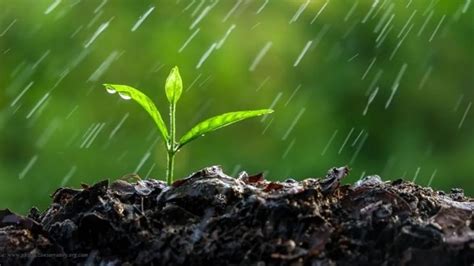Scent Of Rain

The scent of rain is a phenomenon that has captivated humans for centuries, evoking feelings of serenity and wonder. The term "petrichor," coined by Australian scientists in the 1960s, refers to the distinctive smell that occurs when rain falls on dry soil or rocks. This unique aroma is the result of a combination of factors, including the release of oils from plants and the presence of certain types of bacteria in the soil.
One of the primary causes of the scent of rain is the release of geosmin, a type of compound produced by certain types of bacteria, such as Actinomycetes. These microorganisms thrive in soil and are responsible for breaking down organic matter. When rain falls, it releases geosmin into the air, creating the characteristic earthy smell associated with the scent of rain. In addition to geosmin, the scent of rain also includes other compounds, such as terpenes and sesquiterpenes, which are released by plants and contribute to the overall aroma.
Chemical Composition of the Scent of Rain

The chemical composition of the scent of rain is complex and varies depending on the location and type of soil or rocks present. However, research has identified several key compounds that contribute to the characteristic aroma. These include:
- Geosmin: a type of compound produced by certain types of bacteria, responsible for the earthy smell
- Terpenes: a class of compounds released by plants, contributing to the fresh, floral aroma
- Sesquiterpenes: a type of compound released by plants, adding depth and complexity to the scent
- Aldehydes: a class of compounds produced by plants, contributing to the sweet, fruity aroma
Factors Influencing the Scent of Rain
The scent of rain is influenced by a variety of factors, including the type of soil or rocks present, the amount of rainfall, and the temperature and humidity of the air. For example, areas with high levels of clay or limestone tend to produce a stronger scent of rain due to the increased presence of geosmin-producing bacteria. Similarly, areas with high levels of vegetation tend to produce a more complex and nuanced scent due to the release of terpenes and sesquiterpenes from plants.
| Factor | Influence on Scent of Rain |
|---|---|
| Type of soil or rocks | Presence of geosmin-producing bacteria, affecting intensity of earthy smell |
| Amount of rainfall | Quantity of geosmin and other compounds released into the air |
| Temperature and humidity | Affects volatility and diffusion of scent compounds, influencing overall aroma |

Key Points
- The scent of rain is caused by the release of geosmin and other compounds from soil and plants
- The chemical composition of the scent of rain varies depending on the location and type of soil or rocks present
- Factors such as the type of soil or rocks, amount of rainfall, and temperature and humidity influence the scent of rain
- The scent of rain has a unique ability to evoke feelings of serenity and wonder
- Understanding the factors that influence the scent of rain can help us appreciate its complexity and beauty
Biological and Psychological Responses to the Scent of Rain

The scent of rain has a profound impact on both biological and psychological responses in humans. The smell of geosmin and other compounds has been shown to stimulate the brain's limbic system, which is responsible for emotional processing and memory. This can lead to feelings of calmness and relaxation, as well as increased creativity and focus. Additionally, the scent of rain has been linked to improved mood and reduced stress levels, making it a valuable tool for promoting overall well-being.
Evolutionary Significance of the Scent of Rain
The scent of rain has played a significant role in the evolution of human behavior and culture. In many ancient cultures, the smell of rain was associated with fertility and abundance, and was often used in rituals and ceremonies to promote crop growth and prosperity. Today, the scent of rain continues to evoke feelings of connection to nature and the outdoors, and is often used in aromatherapy and other holistic practices to promote relaxation and well-being.
What is the primary cause of the scent of rain?
+The primary cause of the scent of rain is the release of geosmin, a type of compound produced by certain types of bacteria, such as Actinomycetes.
What factors influence the scent of rain?
+The scent of rain is influenced by a variety of factors, including the type of soil or rocks present, the amount of rainfall, and the temperature and humidity of the air.
What are the biological and psychological responses to the scent of rain?
+The scent of rain has a profound impact on both biological and psychological responses in humans, stimulating the brain's limbic system and leading to feelings of calmness and relaxation, as well as increased creativity and focus.
Meta Description: Discover the fascinating science behind the scent of rain, including its chemical composition, factors that influence its intensity, and its impact on human biology and psychology. Learn how the scent of rain can evoke feelings of serenity and wonder, and explore its evolutionary significance and cultural associations.



